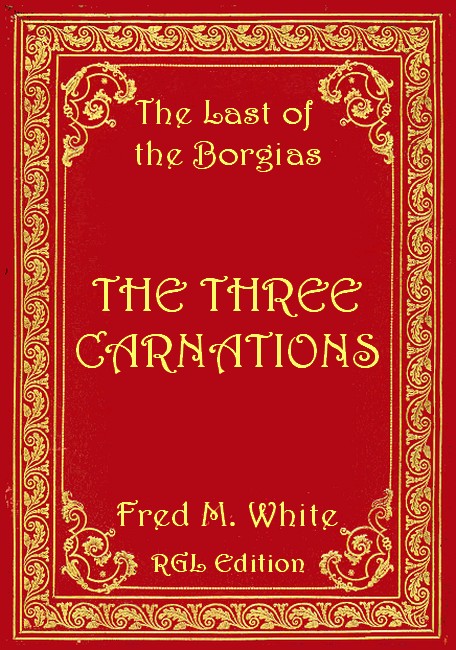
RGL e-Book Cover 2019©

RGL e-Book Cover 2019©

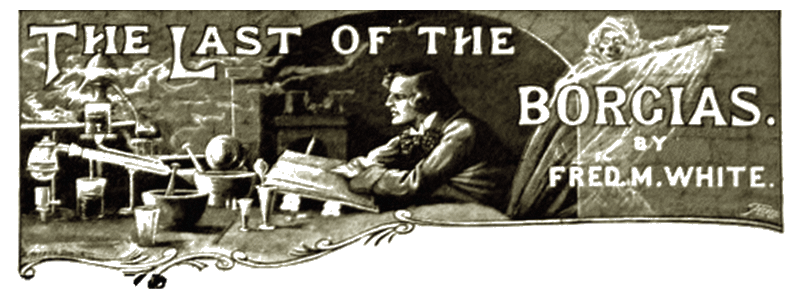
COLONNA read the item over his breakfast. He was by no means surprised, and not in the least shocked. The thing was more or less of a tonic. Colonna had known the multi- millionaire slightly. Paul Chesterton belonged to the class of capitalists who usually live in palaces and die just at the psychological moment. This considerate action prevents any additional burden being added to the poor-rate.
"An accident," Colonna muttered. "Perhaps so. Chesterton has loomed large as a capitalist of the mushroom order for eight years—an unusually long innings. Only yesterday it was announced that he had purchased a group of islands in the South Pacific. In that case there will probably be sufficient for the bare funeral expenses."
Colonna's languid cynicism was rudely interrupted at this point by the abrupt entrance of an individual whose features were agitated by a painful emotion. The intruder was no less than Sir Reginald Bellamy, who, as everybody knows, is one of the props and pillars of Her Majesty's administration.
"Have you heard the news?" he gasped.
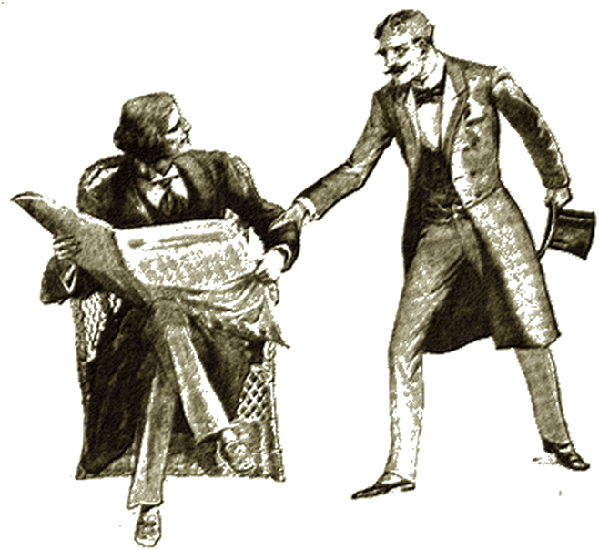
"Have you heard the news?" he gasped.
"I am at present engaged dissecting it from the pills and philanthropic advertisements," said Colonna; "really, the bulkiness of our modern papers—"
"For Heaven's sake, don't jest with me, man. It's a serious matter for me. Of course you have seen the announcement of Chesterton's death."
"To be truthful, I have. But why should it impress you so painfully?"
"I came here with the express purpose of telling you. Colonna, money is absolutely no object whatever, and you must help me. The thing was bad enough before, but Chesterton's death means ruin to me, and, Heaven knows, I have worked for my position."
Colonna nodded sympathetically. Of all the statesmen in the country, none were more admired, respected and trusted than Reginald Bellamy. It is not often that an ex-Colonial makes a mark in the Commons, but Bellamy was an exception. By the time he was fifty-five people had forgotten almost that his fortune had been made in the South Pacific. Who and what his family had been, people neither knew nor cared. They respected the man now for what he was.
Of course, queer stories were told about his youth. Amongst others that he had been driven from home, and turned pirate. At forty, he had abandoned a career of vice and embarked on the prosaic paths of respectability. But nobody seriously lent an ear to these highly-coloured romances.
"Tell me what is wrong," suggested Colonna.
"I am just coming to it," said Bellamy. "You remember the Manu Islands annexation, of course, and how the Opposition blamed us. The inevitable revolution followed, and was suppressed. The Islands were too rich to be abandoned. Our opponents said we were wrong—England seems to be always wrong with some people. Still, there would have been an end of the matter had not the Opposition pressed for a Commission to inquire into the whole business. Strange, isn't it, that a certain class of Briton can never see their country in the right?"
"Men like Snarler, the Member for Glassboro', for example?"
"Quite so. And Snarler is animated by a personal bias against me. Well, the Commission has dragged on day after day, and nothing has come out as yet. There is nothing to come out. And yet, if this thing proceeds further, I am ruined, body and estate."
"Pardon me if I ask you to be a little more explicit."
"I will put it brutally if you like. You have followed this matter carefully? Very good. You have heard of a certain notorious Fred Kelly, who appears to have figured prominently in Manu Islands' politics up to twenty years ago. Kelly was a piratical rascal who got the upper hand yonder, and carried on in a manner of which the less said the better. Had our Government of that day got hold of him, Kelly would have been hanged. As it was, he paved the way for annexation, and now our opponents want to re-open the brutal Kelly days in the inquiry. They have witnesses to call who knew Kelly well—they hope to lay their hands upon Kelly yet. Now this Kelly reformed ages ago; he married an angel, Colonna, who made a new man of him. He changed his name and his life, he became rich and steadied down. He returned to England. To-day he is widely respected. If this thing goes on he is exposed—his family are disgraced. Colonna, I am Fred Kelly!"
Colonna stared at his companion in astonishment; a faint pink hue had crept over Bellamy's bronzed features.
"It is a fearful position, certainly," said Colonna; "and I quite see the wisdom of keeping these facts from the public, especially as you are not blameless. But how was Chesterton going to help you?"
"He was coming to England shortly to make a clean breast of the whole matter, and whitewash me if it became necessary. He was my alter ego in the bad old days. And he's dead."
"And you want me to help you?"
"I do. Never was man in need of help as sorely as I am. Colonna, you claim that you can do marvellous things—nobody will suspect you—"
"Suspicion would never deter me," said Colonna. "I know I am perfectly safe. But you might tell me what you require me to do."
"Yes, yes. As you are aware, the public is sick and tired of this absurd farce. Certain members of the Opposition are simply keeping it going on in the off-chance of something damaging to the Government coming out. What we want to do on Friday is to settle the question of alleged native oppression once and for all. It will be moved as an instruction to the committee that the matter be closed, and, if carried unanimously, the thing is at an end. But it won't be carried unanimously. Snarler and Egan and Dankins will oppose the motion vehemently. If they do, we are bound to allow the Inquiry to proceed. If they re-open the Kelly group of facts——"
"You are going to set me a difficult task," Colonna smiled.
"That is why I pay you the compliment of coming here," said Bellamy. "I want you to close the mouths of these people; I want you to so work it that they shall not oppose the motion—even make them support it, if possible. Can you do it?"
It was a long time before Colonna replied. The task set him was no light one. With all the many strange and terrible poisons at his disposal, yet there remained an ingenious and novel scheme to be perfected.
"I can do what you require," he said. "In a clumsy, inartistic fashion I could do that at a moment's notice. But what is required here is tact and finesse, or you are certain to hear of the matter again. The thing will cost money."
"Did I not tell you before that money was no object?"
"Very good. Already a hazy idea has occurred to me. Being deeply interested in political matters, and being a frequent visitor at the House of Commons, I know all the members of the Inquiry more or less well. Is not Snarler's house in Park Lane very close to your own?"
"Next door but one."
"And the house between?"
"Is closed for the present, as Lord Branksmore and his family are abroad. It is in the hands of agents to let, if possible, till the end of the season."
Colonna's eyes lighted up. He began to see his way. "That is especially fortunate," he exclaimed. "Now—at your expense, of course—I am going to take Branksmore House till the end of the season, for an Australian financier—a wealthy Mr. Harris in fact—whose name need not be mentioned. If the Australian finds himself subsequently detained abroad, it will not matter."
"Go on," said Bellamy. "You can't tell how you interest me."
"Until the arrival of the mythical Croesus," said Colonna, "I shall occupy those premises. You and Snarler are on social terms, of course?"
"Oh, yes. We dine one another in the hope that some time we may have the bliss of seeing the other choke himself. A great thing is civilisation."
"That is exactly as it should be," Colonna went on rapidly. "I think I am correct in assuming that Friday's meeting of the Inquiry is at five? Very good. Money can do most things, and with yours by Tuesday night I propose to be settled in Branksmore House as a warming-pan for my friend. On Friday you will please to keep yourself open, because on that day I am going to lunch all the members of the Inquiry."
"And after that, my dear sir?"
"No, no," Colonna smiled, "for the present I am going to tell you nothing more. As I shall be more profitably engaged, will you please to see to the prosaic details for me—I mean as to Branksmore House. Your secretary will do all that and send the key to me. As for servants, I shall only require what are in the house. I shall get the luncheon sent in, waiters and all. You can go away with an easy mind."
Sir Reginald Bellamy certainly stepped into his brougham with a more benign expression than he had brought with him. Directly his visitor had departed, Colonna flung himself into a chair and gave himself up to thought. At the end of an hour he rose, and a little later left the house dressed more correctly than his wont. Presently he entered a dingy little shop in New Street, a beetle- browed establishment that looked strangely out of place there. A little, shrivelled man behind a mahogany counter waited the commands of his customer.
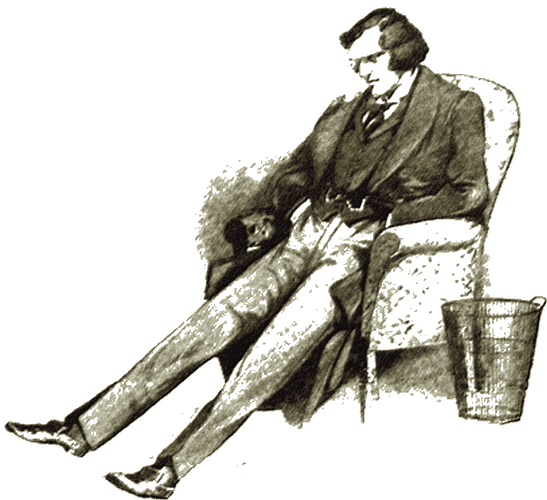
Colonna flung himself into a chair and gave himself up to thought.
"I don't require much, Mr. Schreiner," said Colonna, "in bulk—that is."
Schreiner, the eminent connoisseur in wines, smiled.
"You could spend a great deal here," he said, "and comfortably carry the proceeds away in your pockets. Is it something rare and curious you require?"
"You have guessed it," said Colonna. "I require three bottles of Tokay. And, what is more, I require your very best. Approximately, what would the cost be?"
"The very best I could let you have three bottles for eighty guineas. But there are grand wines at half the money."
"So I should imagine," Colonna said drily. "But it so happens that I must have the best. An old wine, I presume?"
"It was an old wine," said Schreiner, "when the House of Hanover came to the throne. I have spent many an hour looking up the pedigree of this Imperial Tokay, and I find it cannot be much less than three centuries old. Tokay is unique in the way of wine: you can open a bottle, leave the cork out for an hour or more, and in a little time it becomes rather better than it was before. The passing of centuries serves only to ripen its wonderful qualities. I believe it would be nectar after a thousand years."
Colonna completed the costly purchase, and gave instructions for the Tokay to be delivered at Branksmore House on the Thursday evening. Then at his club he partook of a frugal lunch of fruit tart and cream, with a glass of hock, and, hailing a hansom, was driven to the House of Commons.
FOR a Wednesday afternoon sitting the House was fairly full.
Colonna flitted about the lobby for the best part of an hour,
until he had succeeded in finding all the members of the Inquiry
with the solitary exception of Snarler. Colonna met with no
refusals for his luncheon party—he was too brilliant
company to be lightly denied. There was only Snarler to be seen
now, and a little later he lounged in.
The leader of the truculent triumvirate was a tall man with a restless eye and a chin denoting high courage, and high obstinacy also. With the tenacity of a bull-dog he had fastened on to his policy, and he meant to hold it to the end.
"My dear fellow!" he exclaimed in response to Colonna's invitation, "I will lunch with you on Friday with the greatest possible pleasure. We can do with a little congenial party like that, for there is sure to be an awful shindy afterwards."
"You'll make nothing of it," said Colonna.
Snarler's big face seemed to expand.
"Sha'n't we," he exclaimed. "I've got two stalwarts behind me in Egan and Dankins. The rest of our party are snobs who will do anything the Chairman tells them simply because he happens to be a noble lord."
"I prophesy your endeavour will end in failure."
"Not unless you play some of your black arts upon us," Snarler laughed. "But that's all nonsense, you know. You are a clever chap, Colonna, but that lecture of yours was full of bunkum as I have told you before."
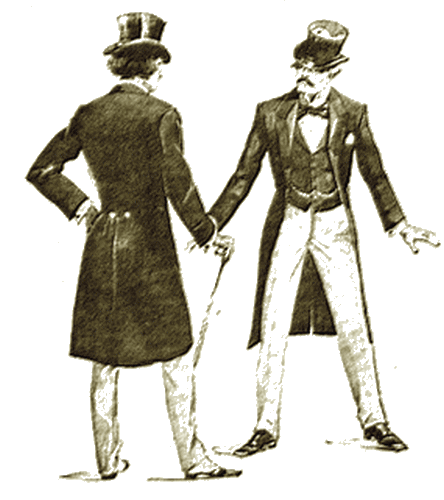
You are a clever chap, Colonna.
"I shouldn't attempt any hocus pocus with you," Colonna said drily. "And no politics on Friday, if you please. And now, as I am probably preventing you from obstructing some useful piece of legislation, I will take my leave."
With which parting shot Colonna went his way homeward, well satisfied with the progress of affairs as far as they had gone.
SIR REGINALD'S business secretary had fulfilled his instructions to the letter, and on the Thursday afternoon Colonna found himself in possession of Branksmore House. Servants there were quite sufficient for the occasion, and, as to the rest, an open order to a caterer of repute sufficed.
All that Colonna did was to personally place the Imperial Tokay in a room which he had fitted up as a temporary laboratory. The bottles were uncorked, submitted to a certain simple-looking process, and then conveyed to the dining-room. When the hour of the fateful luncheon arrived, Bellamy was first to appear.
"I suppose it's all right," he said. "I'm terribly anxious."
"So anxious that coming here as the preliminary guest is an indiscretion," said Colonna. "Will you oblige me by passing through that conservatory into the garden. I chose this room for luncheon as the coolest and most pleasant in the house. No room is perfect unless there is a conservatory attached."
Sir Reginald took the broad hint, and disappeared. Presently other guests began to arrive, and, as they did so, they were conducted to the garden. It was cool and shady there, the seats were of a luxurious description and when a waiter appeared carrying a silver tray on which stood a number of tall frosted glasses musical with the clink of ice, a feeling of gratitude to Colonna prevailed.
"Some novelty," murmured the noble chairman.
"I may say so without egotism," said Colonna. "It is adapted and composed from a recipe I picked up in South America. As a tonic and appetiser it has no equal. But do not be sad—you shall all taste for yourselves."
"Alcohol?" Snarler suggested with a flash of his nostrils.
Colonna nodded, whereupon Snarler flatly refused to drink. It is perhaps hardly necessary to say that Egan and Dankins followed his example.
"I'm practically a teetotaller," supplemented the leader, "and in any case I could not touch liquor to-day."
Colonna did not seem displeased. As a matter of fact he had counted upon this abstention on the part of the stalwarts.
"That is a pity," he said, "because I have something unique to offer you presently. I still hope you will modify your scruples so far as to taste the wine. It is possible to carry eccentricity too far."
"I find it, on the other hand, a capital advertisement," Snarler said with cynical frankness.
Snarler passed in the House for a wit, which was his misfortune rather than his fault. A Parliamentary humourist is not of necessity a criminal. In the laughter which followed luncheon was announced.
Beyond all question the function was a success. The combination of simplicity and good taste, perfect gastronomy absolutely free from ostentation, is an art. Colonna had been absolutely successful. Before the peaches were all rifled of their sweetness, the lion was lying down placidly with the lamb. Snarler and Bellamy were comparing notes under the amused gaze of Lord Macedon, who was more accustomed to see them, figuratively, at each other's throats.
"'Pon my word, you're a wonderful chap, Colonna," he said. "Before we've finished, I shouldn't be surprised to hear that those two fellows have taken some shooting together."
"I should not care to precipitate a tragedy like that," Colonna smiled. "All the same, is it not a pity to spoil your sport for this afternoon? Without these battles, your sittings must be deadly dull."
"It will be deadly dull to-day," said Macedon. "By the way, didn't you say something about some wonderful wine you are going to give us?"
"I am obliged for the reminder. Positively, I had forgotten all about it. As I always look to these things personally, I'll get you to excuse me for a moment."
Colonna disappeared, only to return presently, bearing in his hand a bottle duly garlanded with patrician cobwebs. The advent of this illustrious stranger was received with decorum and respectful silence. Snarler and his two friends alone seemed unimpressed. But, then, they were avowed iconoclasts.
"Imperial Tokay," Macedon murmured; "and royal at that. Colonna, if you are curious as to your wines, never send three of your sons into the army."
A hush fell upon the gathering. Bellamy appeared to be deeply interested. He divined in some occult way that the production of the flask initialled the plot evoked by Colonna. The latter poured out the fluid into small glasses and passed them round. A delicious perfume pervaded the apartment. With a feeling of dismay which he would have found it hard to account for, Bellamy saw Snarler put his glass firmly aside.
"Oh, come," Colonna cried, "you are under no monastic vow."
"Not in the least," Snarler replied. "I don't even profess that my refusal is a matter of conscience. But I have an important task before me, and I do not touch anything intoxicating until it is over."
The other two sides of the triangle murmured approval. It was clear that none of them meant to touch the divine liquid.
"Noble self-abnegation," Macedon murmured. "There will be all the more for the rest. The wine we are now privileged to profane with our lips—"
And the noble lord drifted into a learned diatribe on the juice of the grape, under cover of which Colonna slipped round to Bellamy's side.
"Check," he whispered. "I see from your expression that you understand—"
"For Heaven's sake, don't tell me it's mate," Bellamy responded.
"The mate will be mine," said Colonna. "To tell the truth, I anticipated something of this kind, and I prepared for it. Keep these people amused for a little time whilst I slip away. I have something that requires seeing to at once."
Bellamy suitably responded. He threw himself heart and soul into his appointed task. All the same, he was genuinely pleased when Colonna returned. The latter nodded meaningly.
"Let us take our cigarettes in the garden," he suggested. A general move was made to the garden by way of the conservatory. The place was a veritable Golconda of rare and beautiful flowers, for Lord Branksmore was an enthusiastic horticulturist, and his blooms enjoyed a wide reputation. Here one or two of the Inquiry Commission lingered admiringly.
"There is a wide choice for a button-hole here," Colonna said.
"Almost a pity to pick them," said another.
"Not at all," Colonna replied. "I have a general discretion. And, to mark the occasion, I am going to decorate you all, but not till we part. The flowers shall be symbolic. Lord Macedon shall have an orchid—"
"My dear fellow," Macedon interrupted, "something a little more modest, I pray you. A buttercup or a daisy, or a pansy for thought."
"Give him a bunch of pansies, then," suggested Snarler.
"I shall give you a carnation, anyway," said Colonna. "In fact, you three must all have carnations. Strong, reliant, and yet with a reserved individuality of your own. Only the flowers should be red."
"Why red?" asked Egan.
"Is not that your colour? Yes, you shall have your red carnations if I have to call in Art to my aid. The carnations here are all cream. Presently I intend to show you a little conceit of my own. You refused a request of mine a little time ago, but I am going to have my own way yet."
Colonna laughingly declined to be any more explicit, and the matter dropped. It was wonderfully cool and pleasant there in the shade—so refreshing and placid that, as he presently looked at his watch, Macedon sighed regretfully.
"Four o'clock," he said, "and time for us Parliamentary Adams to be turned out of Paradise. I expect my brougham is waiting for me."
"Stop!" Colonna cried, as the conservatory was reached. "Don't forget the flowers."
He passed rapidly from plant to plant, snipping a bloom here and there, and these he dexterously arranged in the lapels of his guests, with the exception of Snarler and his lieutenants.
"Why are we to be left out in the cold?" asked the latter.
"You are not forgotten," Colonna smiled drily. "These three carnations are for you. But they are not quite ready yet. Follow me."
On the dining-room table stood an unopened bottle of the Imperial Tokay. Colonna took a dagger from the carved mantel, and striking the bottle dexterously, knocked the neck clean off at the shoulder.
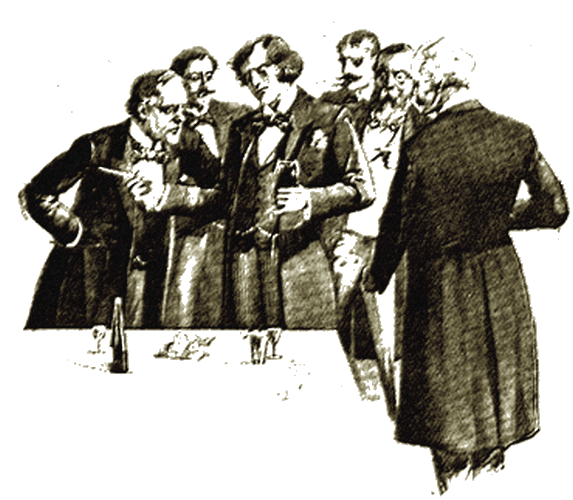
Colonna knocked the neck clean off at the shoulder.
"You shall not go away entirely innocent of this," he said. "Behold the wonderful virtues of this ruby liquid. I have here three cream carnations—I desire to transform them to a vivid and lasting red. I take them one by one and plunge the heads in thus—there are your red carnations. The colour will not run."
Colonna shook the red drops from the petals, and a minute later the stalwarts were all decorated with vivid emblematic crimson.
"It brings out the scent overpoweringly," said Snarler.
"It is very magnificent, imperial, as befits the blood in the veins of our host," Macedon sighed. "But to waste ambrosia like that is little short of madness."
"It has not been wasted," Colonna murmured.
As he looked up he caught Bellamy's eye and smiled. By this time the exodus was general. Bellamy lingered behind.
"Well?" he asked eagerly.
"Nothing could be better," Colonna replied. "Success is assured now, to say nothing of a little comedy I have worked out. I fancy I will come down to Westminster with you, Bellamy, and see the thing out. Then I will come and dine with you, and explain matters afterwards."
Bellamy caught eagerly at the suggestion.
"My dear fellow," he said, "I shall only be too glad of your company."
THE politically curious had gathered in force at Westminster Hall. Startling revelations were confidently expected; indeed, Snarler had pledged his reputation that the next sitting of the Inquiry would be productive of fateful happenings.
When Bellamy arrived there the triumvirate were already foregathered. The weight of nations appeared to weigh upon the brow of each. Bellamy bowed coldly and distantly, thereby conveying to Demos that the feud of Capulet and Montagu was present here. Colonna slipped into the gallery unobserved a few minutes later. He could see the gentlemen of the Press laughing and chatting together as if some joke hugely tickled them.
It was evident from the very first that Snarler was bent upon aggressive tactics. There were one or two witnesses to be examined before the real business of the day came on for further discussion, and all and sundry of these came in for severe handling from the astute and acidulated Snarler.
A little man with a keen eye and brown face met the foe unflinchingly. He certainly made one or two damning admissions, but there are limits.
"And yet you call your self a patriot," Snarler sneered.
"I should hardly accept you as an authority on the subject," retorted the witness, "or your two friends either. Anybody can wear the colours of the British flag, but whether they are sincere or not is quite an other matter."
"I appeal to the chairman," Snarler said. "I should like to know what the witness means."
Macedon sat silent for a moment. Then he removed his eyeglass, polished it carefully, and replaced the monocle. There was a queer, repressed smile upon his face as he rose to speak.
"I presume," he said, retaining his gravity with some difficulty, "that the witness refers to the flowers you three gentlemen are wearing. It is a little singular that a trio of known socialistic leanings should sport the red, white, and blue."
Snarler glanced at the carnation in his button-hole. Sure enough, it was still deep red, but Egan's flower was white, and Dankins' a royal blue. Every man present rose to the suggestion; a deep, raucous laughter filled the chamber. The Press fastened leech-like upon the striking co incidence.
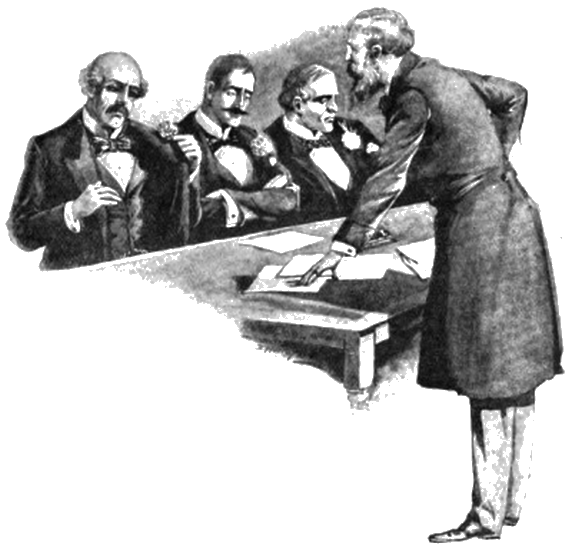
Snarler glanced at the carnation in his button-hole.
Neither Egan nor Dankins said anything. They did not even smile. Their thoughts seemed to be far away in some pleasant dreamland, where politics ceased from troubling and Commissions were at rest. Even Snarler seemed to be struggling against the same soothing influence.
"Have you any further questions to ask the witness?" said the Chairman. Snarler signified that he was quite content. Two more malevolent members stepped gallantly into the breach, but Snarler was strangely silent. Positively he had no questions to ask at all.
Perhaps the strange translation of the carnations filled his mind. The audience thrilled uneasily as the crux of the drama was reached.
"We will now discuss the motion to terminate the Inquiry at this stage," said Macedon.
Still the mutineers gave no sign. Each and all of them smiled benignly. They continued to do so even when a Government nominee rose to propose a resolution.
"I beg to move," he said glibly, "that this Committee resolve that the Instruction be made absolute. Every witness who has come before us has been remarkably, strikingly candid; no fact has been concealed. We have probed the problem to the root. We have absolutely proved nothing."
"And I beg to second that."
The Chairman challenged Snarler with his eyes. The latter rose in perfect silence.
"It seems to me, sir," he said with a benign, benevolent expression, which came as a new light to the caricaturists there. "It seems to me that the Right Honourable Baronet is right. This laughter is most unseemly. Personally, I am tired of the whole business. What we want is rest and quietness."
The listeners followed in a kind of dream. Had Snarler all these years been a rampant patriot in disguise? He smiled with the same benign expression, he nodded as if to drowsy music, then his head fell forward and he gently slumbered. Egan and Dankins appeared to be under the same peculiar spell.
"There's some magic here," Macedon said. "Snarler comes out as a Codlin, and Egan, with that appropriate white carnation, is doing the part of an educated Short. 'Pon my word I shouldn't be surprised to hear Dankins—Bellamy, those fellows touched no wine to-day?"
Not to be behindhand in amiability, Dankins when his turn came proceeded on similar lines.
"Put the motion, man," Bellamy whispered hoarsely, "put the motion. Then I'll move the adjournment without delay."
The motion was put and carried unanimously, and the adjournment followed as a matter of course. Then the excited audience filed out to discuss the extraordinary turn of affairs. Bellamy crossed to thank Colonna, but the latter had disappeared.
AS Bellamy sat behind the walnuts and the wine he looked another man. Colonna had lightly parried his many professions of gratitude.
"Really, my dear fellow, the thing was quite easy," he said. "All I had to do was to render those three fellows amenable to reason. With this end in view I prepared three special glasses of the Tokay. There was just a chance that they would not touch it, and, failing that, I had another card to play. You saw how I played it. The second bottle of Tokay was, so to speak, made up for the occasion. The top had been cut off before, and the inside divided into three compartments each heavily charged with a pungent extract very like alcohol. In these the carnations were steeped.
"Being right under the noses of our friends, the fumes mounted to their brains—to all practical purposes they were intoxicated. The stuff utterly destroys all will-power, and fills the victim with an amiable desire to do just what he is asked on the spur of the moment. But I had to slightly vary the strength of the poison according to the temperaments of my patients. Of course you know that alcohol never affects two men in the same way. Snarler is combative, and therefore he should have shown all the fervour of the apostate. But his dose was a little too strong. It turned out all right; though Egan assumed the gentle, candid spirit, Dankins was more melancholy and pessimistic than usual. But they'll live their recantation down—your modern chameleon politician can live down anything. And you are saved."
"I am, indeed. But those flowers! That was marvellous!"
Colonna smiled gently. "Not at all," he said. "The easiest part of the comedy. I merely charged the three tubes in the bottle with certain aniline dyes that produced the desired colours directly the flowers dried. I introduced that merely for dramatic effect. Pretty little tableau, wasn't it?"
"My dear fellow," Bellamy replied. "Nobody is in a position to appreciate it so perfectly and impressively as myself."